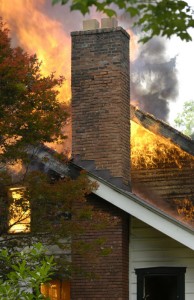Avoiding Holiday Chimney Fires
During the holidays, homeowners take pride in their homes more than ever. Decorating, hosting parties, and relaxing in a clean, beautiful home is the best way to spend the holidays. If you have a fireplace, you are a step ahead of many who wish they had a crackling fire to open gifts by and to hang stockings above. Your fireplace is a great asset, and a coveted one, so make sure it stays that way and does not become a liability.
Chimney Fires
A Dirty Chimney
When your fire is burning, byproducts are released that need venting. Your chimney vents smoke, soot, particles, and tar fog up the flue and out of the house. As these materials rise up the chimney, some amount of it is left on the flue walls—this is called creosote. Creosote is not a major issue if your chimney system is cleaned regularly. It’s easily cleaned away, but can become a problem if allowed to buildup into what’s called “glazed creosote”. Creosote consists of mostly tar, making it flammable. When left in the flue it heats and melts, and moisture evaporates out of it leaving behind a concentrated mass of fuel. Glazed creosote is not only highly flammable, but also more difficult to remove than a regular layer of soot and creosote.
What You Can Do
The easiest way to avoid chimney fires, malfunction, and damage in general is to take care of the chimney.
–Schedule Routine Sweeps
During a chimney sweep, the flammable creosote is cleared away before it can ignite. Soot and debris is also cleared away before it can buildup and obstruct airflow. When the flue is dirty, airflow slows and the smoke, hot gases, and sparks can slow down in the flue, raising risk of fire as well as lowering efficiency of the system.
–Schedule Annual Inspections
CSIA inspections may be the only time a professional gets a look at your chimney from top to bottom. Recommended annually and required by many homeowners insurance policies, the inspection is the most important measure you can take to prevent a chimney fire. Most homeowners don’t know what to look for and will not notice damage until it is too late. During an inspection, a chimney expert assesses the entire system, and reports their findings, big or small. When you schedule your annual inspection in the fall, rest assured that your chimney is ready for fires all winter. If you haven’t scheduled yet, there is still time.
–Practice Fire Safety
You should always practice fire safety and teach your family to do likewise. Never burn trash, clothes, or paper in your fireplace. Many man-made materials will burn incompletely, bringing down efficiency and raising fire risk. Even some organic materials are not appropriate for burning. Paper and leaves are so light, they can rise up the flue while ignited! It’s best to only burn properly seasoned firewood in your fireplace for a safe and efficient fire.
For all of your questions about chimney maintenance, fire safety, and preventing chimney damage this winter, call Chief Chimney Services at 631-863-2460!

